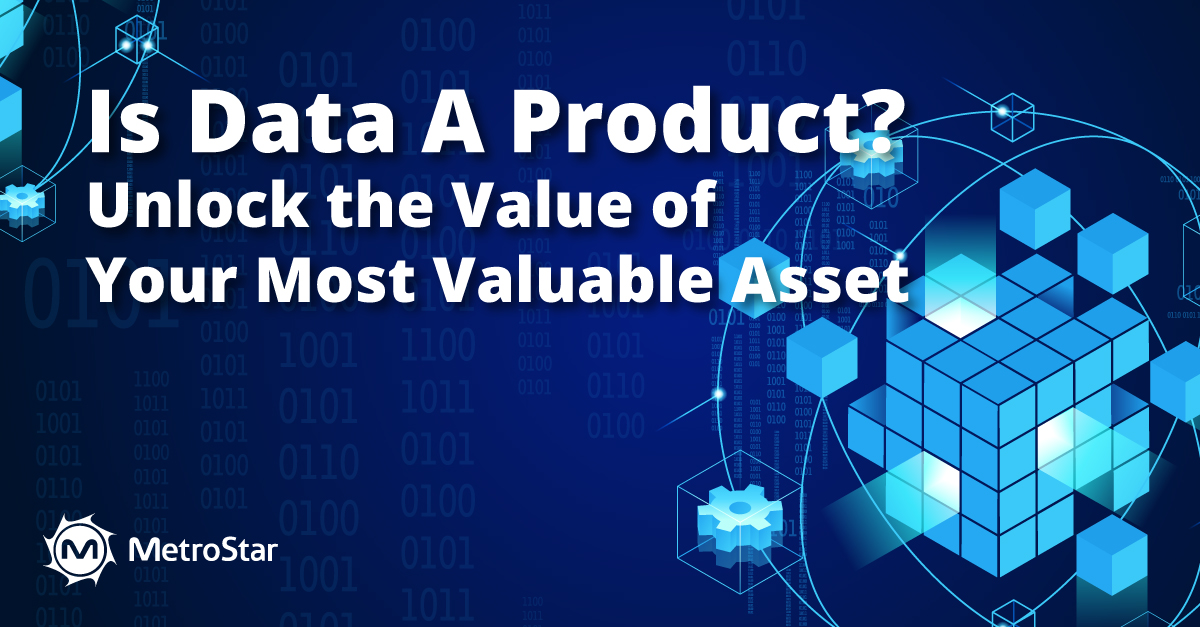Is Data a Product? Unlock the Value of Your Most Valuable Asset
3 MIN READ
11/28/2023 | Data Analytics

Data has become an invaluable asset for organizations across industries in today's digital age. However, many businesses struggle to fully utilize the potential of their data, leaving valuable insights untapped and opportunities unrealized. The key to unlocking the true value of data lies in adopting a product mindset - treating data as a product in itself. In this blog post, we'll explore what it means to embrace the concept of "data as a product" and how it can revolutionize how organizations leverage their data.
Embracing the Product Mindset
When discussing a product mindset with data, we're referring to a shift in perspective - viewing data as more than raw numbers and information. It's about recognizing that data holds immense potential, and by treating it as a valuable commodity, organizations can extract maximum value from their datasets. Like any other product or service, data should be designed with user needs in mind, focusing on creating solutions that deliver real value.
Coined by Zhamak Dehghani, "data as a product" emphasizes the importance of understanding users' requirements and delivering data in ways that genuinely inform decision-making processes. This approach requires deep insights into how users interact with data, their preferred methods of consumption and visualization, and ultimately, aligning those needs with business objectives.
The Role of Data Domains
Organizations need to consider various aspects surrounding their datasets to effectively adopt a product mindset with data. Asking questions such as:
- What kind of data exists within the organization?
- Who needs access to this data?
- How does it flow within different systems?
- What is its purpose?
- Can we make it more accessible?
- Is it compliant and actionable?
These considerations help identify critical domains where improvements can be made to enhance the usability and value of the data.
Characteristics of an Exceptional Data Product
A well-designed data product possesses specific characteristics that make it truly stand out. Let's take a look at some key attributes of an exemplary data product:
-
Discoverable | A data product should be easily discoverable, ensuring users can locate and access the relevant datasets efficiently. Clear documentation, intuitive search functionalities, and well-organized catalogs enhance discoverability.
-
Addressable | Being addressable means users can easily reference and link to specific datasets within the organization's data ecosystem. This allows seamless integration with other systems and facilitates collaboration across different teams.
-
Self-describing |A self-describing data product provides comprehensive metadata, enabling users to understand its structure, format, and meaning without extensive manual deciphering. Clear documentation and standardized schemas contribute to making data self-descriptive.
-
Interoperable | Interoperability is essential for a data product to integrate seamlessly with existing tools and platforms. Organizations can maximize the value derived from their data assets by ensuring compatibility with various systems and APIs.
-
Trustworthy | Data integrity is paramount when building trust among users. A good data product instills confidence by implementing robust quality control measures, maintaining accurate records, and providing transparent information about data sources and transformations.
-
Secure | Protecting sensitive information is critical in today's digital landscape. A reliable data product incorporates strong security measures to safeguard confidential data from unauthorized access or breaches.
Calculating the Benefits of Treating Data as a Product
Determining data's value requires more than intuition or assumptions; it requires an evidence-based approach. Growth boards provide agile governance structures where empirical evidence rather than subjective opinions drive decisions. These boards focus on business value, challenge assumptions through hypotheses testing, embrace learnings from experiments, and ensure transparency in decision-making processes.
By treating data as a product, organizations enable users to discover high-quality datasets securely and effortlessly. They empower individuals across the organization to harness the power of data, driving innovation and informed decision-making.
Elevate Your Data's Potential
Viewing data as a product isn't just a passing trend. It signifies a profound mindset shift that unlocks the true value of your organization's most precious asset. By embracing a product-oriented approach to data management, organizations can craft exceptional data products that captivate users, streamline decision-making, and propel business success. So, take the leap and elevate your data's potential by treating it as a prized product. Witness the transformative impact it can have on your organization. Start harnessing the power of data today and unleash your organization's full potential!
Don't miss out on thought leader content. Subscribe to our monthly newsletter.

Written By:
Hannah Hunt
you might like these too
MetroStar Integrates Salesforce for Next-Gen Manpower Management
Cloud | DevSecOps | AI/ML | Data Analytics | Our Work
Census Data Provides Insights for College Cities Sustainable Growth
Human-Centered Design | Data Analytics | Our Work
The Data Behind Urban Growth & How to Sustain It Smartly
Feature | Human-Centered Design | Data Analytics
want to stay in the loop?
Never miss a thing by signing up for our newsletter. We periodically send out important news, blogs, and other announcements. Don’t worry, we promise not to spam you.

